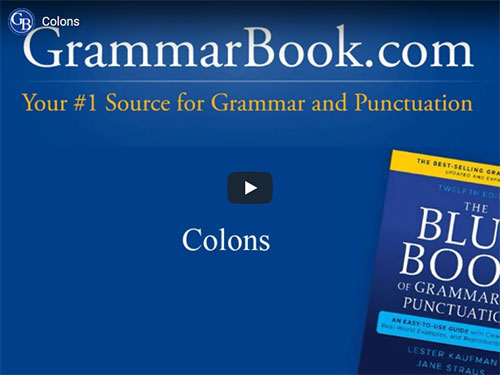|
Grammar mistakes remain common in daily communication. While those of us who spend time at GrammarBook.com can reduce such solecisms, even the most observant can still potentially be duped by the occasional sneaky error.
Because grammar mistakes in American English have always been and likely always will be, we thought it'd be fun and informative to review the ones that still tend to occupy the top spots on the list of snafus.
(You might notice you've seen many of them before.)
Top 10 Grammar Mistakes 2024
The following inaccuracies populate the trouble roster in no particular order.
1. Dangling modifiers. A modifier is a part of a sentence that describes another part. Because speech doesn't always have the processing speed to align modifiers perfectly, they will typically be more misplaced when we talk. In our writing, which does afford the time for more thought, they should appear where they belong if we wish to be clear.
A modifier is dangling when it describes the wrong element in a sentence.
Dangling: Never likely to turn down free food, the jumbo-size bag of Doritos was too much for Goose to ignore. (The modifier describes "bag," which is nonsensical.)
Not Dangling: Never likely to turn down free food, Goose could not ignore the jumbo-size bag of Doritos. (The modifier describes "Goose," which is grammatically accurate and clear.) |
Modifiers should always be placed as close as possible to the element being modified.
2. Run-on sentences. A run-on sentence joins two independent clauses either with a comma splice or no punctuation.
Comma splice: The grass is getting long, you should mow it soon.
No punctuation (fused sentence): The payment system crashed paychecks will be delayed by a day. |
To avoid such sentences, we need to include markers that clearly identify the independent clauses as either separate or modified by a subordinating clause.
The grass is getting long. You should mow it now. (Periods properly separate the independent clauses.)
Paychecks will be delayed by a day because the payment system crashed. (Adding because makes the payment system crashed a dependent clause that modifies the independent clause.) |
3. Homophones. A homophone is each of two or more words that sound the same but have different meanings and often different spellings.
Examples
your, you're
its, it's
there, their, they're |
Your really buying a new Porsche?
Sandra's cat might chase it's own tail, but mine doesn't.
Jason said their going to the Dodgers game tonight. |
These mistakes will not affect our speech, but they will always stain our writing. Precise and eloquent writers will consider the spellings and meanings of similar-sounding words in order to use the right ones.
You're really buying a new Porsche?
Sandra's cat might chase its own tail, but mine doesn't.
Jason said they're going to the Dodgers game tonight. |
4. Adverb and adjective confusion. At times we might mistakenly interchange adverbs and adjectives.
Examples
I've been working real hard on my essay. (adjective)
We better get home quick before the rain starts. (adjective)
Leticia dances good. (adjective) |
All of these sentences are incorrect. Adverb and adjective confusion can often result from conversational habits spilling into our written ones. As with homophones, we want to remain mindful of our word choices and types.
Examples
I've been working really hard on my essay. (adverb: correct)
We better get home quickly before the rain starts.(adverb: correct)
Leticia dances well. (adverb: correct) |
5. Subject and verb agreement. Grammatical accuracy in a sentence requires a subject and a verb that align in number. A singular subject should have a singular verb, and a plural subject should have a plural verb.
Incorrect: The audience are applauding the performance.
Correct: The audience is applauding the performance. (collective singular noun, singular progressive verb)
Incorrect: See that? The alignment of those stars form a smiley face.
Correct: See that? The alignment of those stars forms a smiley face. (singular subject modified by a prepositional phrase, singular verb) |
In addition to mastering primary subject and verb agreement (e.g., the leaves rustle), understanding the interplay of verbs with collective nouns modified by a prepositional phrase will further reinforce skill in this area.
6. Subject and object pronouns. Whether in daily conversation, newspaper articles, or movies and TV, the belief that "___ and I" is proper formal grammar in all contexts still often prevails.
Correct grammar places subject pronouns in subject positions and object pronouns in object positions.
Incorrect: Would Aaron like to go to the park with Jerrod and I?
Correct: Would Aaron like to go to the park with Jerrod and me? (The pronoun is the object of a preposition, making it an objective pronoun.)
Incorrect: Me and Ravi would like our burgers well-done.
Correct: Ravi and I would like our burgers well-done. (The pronoun is the subject of the sentence, making it a subjective pronoun. Placing the first-person subject pronoun last also is considered polite, proper form.) |
7. Malformed verb phrases. Some verb phrases endure although they still hit left or right of the bulls-eye. Among the most common are must/should/would/could of and try and.
Incorrect: That tool shed must of taken a long time to build.
Correct: That tool shed must have taken a long time to build.
Incorrect: Let's try and get it done before six p.m.
Correct: Let's try to get it done before six p.m. |
8. Lay and lie. The distinction between these verbs can remain elusive even for those with a firm grip of grammar.
Lie means "to recline" or "tell a falsehood." It is an intransitive verb, meaning it does not take an object.
Lay means "to place or put." It is a transitive verb, meaning it takes an object.
Incorrect: The scarf is laying on the bin.
Correct: The scarf is lying on the bin.
Incorrect: I'm pretty sure Barry lay the shovel in the yard.
Correct: I'm pretty sure Barry laid the shovel in the yard. |
9. Misplaced or misused apostrophes. Over time the apostrophe has become the all-purpose tool of punctuation. It has served in functions ranging from ownership to plurality, although not always in grammatical ways.
Incorrect possession: Please give the dog it's bone.
Correct possession: Please give the dog its bone. (Its is a possessive pronoun that does not include an apostrophe. Refer to Grammar Mistake #3 as well.)
Incorrect plural: They gave me five day's leave because of my injury.
Correct plural: They gave me five days' leave because of my injury. (The modifying compound noun, five days, is plural, so the apostrophe should appear after the s.) |
10. i.e. and e.g. They're both abbreviated forms of parenthetical statements, and they both originate from Latin. Beyond those similarities, they mean different things that are often confused.
The abbreviation i.e. means id est ("that is to say," "in other words"), and e.g. means exemplī grātiā (for example). We use i.e. when we want to restate or reiterate we've just written. We use e.g. when we want to introduce examples of what we've just described.
Incorrect: We should probably eat a healthier meal (e.g., let's get a salad).
Correct: We should probably eat a healthier meal (i.e. [in other words], let's get a salad).
Incorrect: This salad needs more veggies (i.e., tomatoes, carrots, cucumbers).
Correct: This salad needs more veggies (e.g. [for example], tomatoes, carrots, cucumbers). |
Related Topic
Clearing the Air of Errors in English
|





